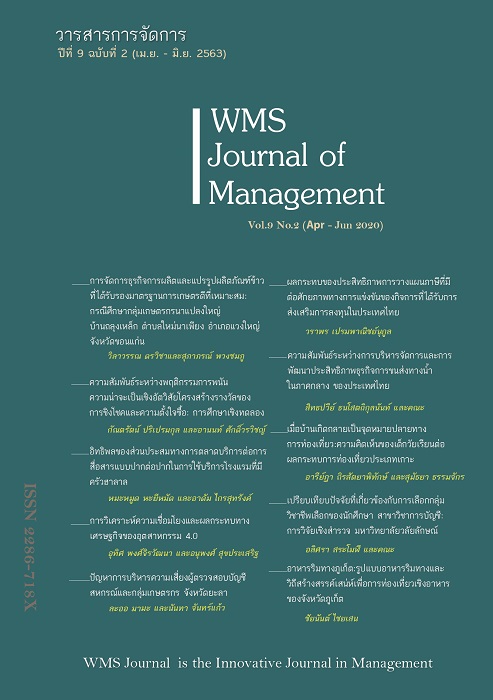Our Homeland is A Tourist Destination: Voices of School-Aged Children towards Island Tourism Impacts
Main Article Content
Abstract
This study examines perceptions of children with different gender towards salient impacts from island tourism development, their life satisfaction in general and their support for island tourism development. This study employed quantitative research method and the census study, including 181 students who studied in the secondary school level 1-6 at Lantaratpracha-uthit School. A structured self-administered questionnaire was used as a research tool. Statistical analysis program was used to analyze the data. Research finding shows that the children have optimistic perceptions towards positive economic impacts generated from tourism. These perceptions encourage them to consider tourism growth on their island as one of main causes of their life satisfaction and their community’s well-being. Furthermore, economic benefits acquired from tourism, which fulfil the children’s physiological needs, are major stimuli that encourage the children to support island tourism development.
Article Details
References
quality of life: the case of Van, Turkey: Proceedings of 2016 International Conference on Hospitality, Leisure, Sports, and Tourism-Summer Session, 427-438, Kyoto, Japan.
Beazley, H. S., Bessell, L., Ennew, J., & Waterson, R. (2006). What children say: Results of
comparative research on physical and emotional Punishment of children in Southeast Asia, East Asia and the Pacific. Save the Children Sweden.
Chili, N. (2015). Perceptions and attitudes of the community towards tourism impacts and sustainable development. The case study of eMpophomeni in Pietermaritzburg (South Africa). Problems and Perspectives in Management, 13(3), 151-159.
Choi, H. C., & Murray, I. (2010). Resident attitudes toward sustainable community tourism. Journal of Sustainable Tourism, 18(4), 575-594.
Churchill Jr, G. A. (1979). A paradigm for developing better measures of marketing constructs. Journal of Marketing Research, 16(1), 64–73
Croes, R., Rivera, M. A., & Semrad, K. J. (2017). 2016 Happiness Survey: Aruba Happiness & Tourism.
Curley, M. (2014). Combating Child Sex Tourism in Southeast Asia: Law Enforcement Cooperation and Civil Society Partnerships. Journal of Law and Society, 41(2), 283-314.
Eusébio, C., Vieira, A. L., & Lima, S. (2018). Place attachment, host–tourist interactions, and residents’ attitudes towards tourism development: the case of Boa Vista Island in Cape Verde. Journal of Sustainable Tourism, 26(6), 890-909.
Graham, A., Powell, M., Taylor, N., Anderson, D., & Fitzgerald, R. (2013). Ethical research involving children. Florence: UNICEF Office of Research–Innocenti.
Kim, K., Uysal, M. & Sirgy, M. J. (2013). How does tourism in a community impact the quality of life of community residents? Tourism Management, 36, 527-540.
Krabi magazine (2018). A Story of How This Quiet Island Shows Positive Signs of Large Expansion in The Coming Years. Retrieved from http://www.
krabi-magazine.com
Kurniawan, F., Adrianto, L., Bengen, D. G., & Prasetyo, L. B. (2016). Vulnerability assessment of small islands to tourism: The case of the Marine Tourism Park of the Gili Matra Islands, Indonesia. Global ecology and conservation, 6, 308-326.
Liang, Z. X., & Hui, T. K. (2016). Residents’ quality of life and attitudes toward tourism development in China. Tourism Management, 57, 56-67.
Liu, X. R., & Li, J. J. (2018). Host perceptions of tourism impact and stage of destination development in a developing country. Sustainability, 10(7), 1-15.
Monterrubio, C. (2016). The impact of spring break behaviour: An integrated threat theory analysis of residents' prejudice. Tourism Management, 54, 418-427.
Morrow, V., & Crivello, G. (2015). What is the value of qualitative longitudinal research with children and young people for international development? International Journal of Social Research Methodology, 18(3), 267-280.
Nunkoo, R., & So, K. K. F. (2016). Residents’ support for tourism: Testing alternative structural models. Journal of Travel Research, 55(7), 847-861.
Nunkoo, R., & Ramkissoon, H. (2010a). Small island urban tourism: A residents’ perspective. Current Issues in Tourism, 13(1), 37–60.
Nunkoo, R., & Ramkissoon, H. (2012). Power, trust, social exchange and community support. Annals of Tourism Research, 39(2), 997–1023.
Pham, K., Andereck, K., & Vogt, C. (2019). Local residents’ perceptions about tourism development. Travel and Tourism Research Association: Advancing Tourism Research Globally 74.
The Phuket News (2015). Phuket tourism cited as key reason for national tourism overhaul.
Retrieved from http://www. thephuketnews.com/phuket-tourism-cited-as-key-reason-for-national-tourism-overhaul-
53779.php#kHKDz507Ib46GpAD
Rivera, M., Croes, R., & Lee, S. H. (2016). Tourism development and happiness: A residents’perspective. Journal of Destination Marketing & Management, 5(1), 5-15.
Spiers, M. (2017) Families with Adolescents: Vacation Decision Making. (PhD Thesis). Victoria University of Melbourne,Australia.
Strzelecka, M., Boley, B. B., & Strzelecka, C. (2017). Empowerment and resident support for tourism in rural Central and
Eastern Europe (CEE): The case of Pomerania, Poland. Journal of Sustainable Tourism, 25(4), 554-572.
Simão, J., & Môsso, A (2013). Residents' perceptions towards tourism development: the case of Sal Island. International Journal of Development Issues, 12(2), 140-157.
Tirasattayapitak, A., & Thammajak, S. (2018). Is island tourism good for me? school-aged children’s voices towards island tourism impacts and well-being in life domains. International Thai Tourism Journal, 14(2), 1-25.
Wang, S., & Chen, J. S. (2015). The influence of place identity on perceived tourism impacts. Annals of Tourism Research, 52, 16-28.
Woo, E., Kim, H., & Uysal, M. (2015). Life satisfaction and support for tourism development. Annals of Tourism Research, 50, 84-97.
Yang, J., Ge, Y., Ge, Q., Xi, J., & Li, X. (2016). Determinants of island tourism development: the example of Dachangshan Island. Tourism Management, 55, 261-271.
Yu, C. P., Huang, Y. C., Yeh, P. F., & Chao, P. H. (2017). Residents' attitudes toward island tourism development in Taiwan. Island Studies Journal, 12(2), 159-176.


